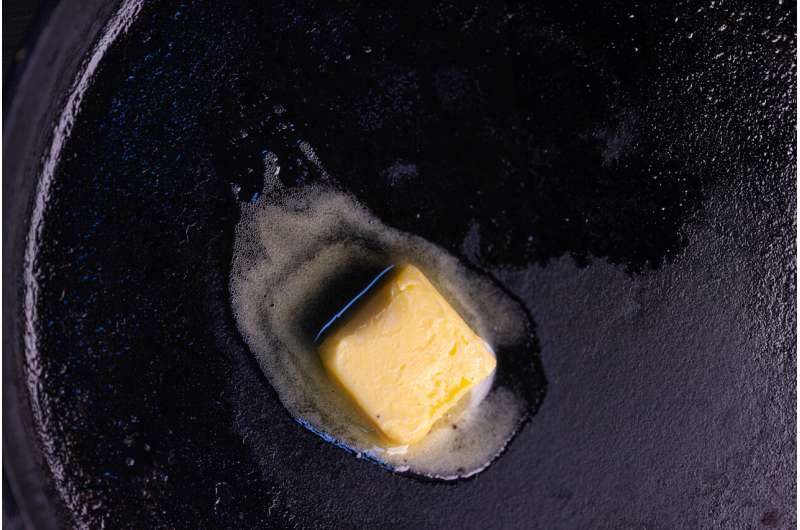This article has been reviewed according to Science X's editorial process and policies. Editors have highlighted the following attributes while ensuring the content's credibility:
fact-checked
peer-reviewed publication
trusted source
proofread
Research team suggests ways to eat our way out of the climate crisis

Agriculture is one of the hardest human activities to decarbonize; people must eat, but the land-use practices associated with growing crops account for roughly a quarter of global greenhouse gas emissions. Researchers at the University of California, Irvine and other institutions evaluate a new solution to this problem, one that eliminates farms altogether.
In a study published in Nature Sustainability, a UCI-led team of scientists assess the potential for widescale synthetic production of dietary fats through chemical and biological processes. The raw materials for this method are the same as those used by plants: hydrogen in water and carbon dioxide in the air.
"Large-scale synthesis of edible molecules through chemical and biological means without agricultural feedstocks is a very real possibility," said lead author Steven Davis, UCI professor of Earth system science. "Such 'food without the farm' could avoid enormous quantities of climate-warming emissions while also safeguarding biodiverse lands that might otherwise be cleared for farms."
Davis and his co-authors highlight other environmental and societal benefits of farm-free food in the paper, including a reduction in water use and watershed pollution, local control over food production, diminished risk of weather-related food shortages, and less need for low-paying and physically demanding agricultural labor. Another plus, according to Davis, would be the possibility of returning existing farmlands to a natural state, which could enhance biodiversity and build up natural carbon sinks.
"I like the idea of not depending on photosynthesis for everything we eat," Davis said. "At whatever scale, synthesizing food will alleviate competition between natural ecosystems and agriculture, thereby avoiding the many environmental costs of farming."
Davis highlighted the practice of razing tropical rainforests to create space for palm oil plantations. Cookies, crackers, snack chips and a lot of other middle-of-the-store products are made with dietary fats coming from this source. He asked if anybody would notice if the oil used to bake their cookies came from a food refinery up the road instead of a plantation in Indonesia.
The authors of the paper said they focused much of their attention on fats because they are the "simplest nutrients to synthesize thermochemically," pointing to established large-scale soap-making and polymer chemistry techniques.
The researchers estimated that agriculturally derived fats correspond to roughly 1 to 3 grams of emitted carbon dioxide per thousand calories, whereas molecularly identical fats synthesized from natural gas feedstock using available electricity would produce less than a gram of CO2 equivalent emissions, and nearly zero emissions if using carbon capture from the air and non-emitting sources of electricity.
"The beauty of the fats is that you can synthesize them with processes that don't involve biology. It's all chemistry, and because of that, you can operate at higher pressures and temperatures that allow excellent efficiency," Davis said. "You could therefore build big reactors to do this at large scales."
A big remaining question is, will people accept food created in this manner?
"Food is a tougher problem than electricity; few people care where the electrons in our wall socket originate, but many people care a lot about where their food comes from," Davis said. "Processed foods are thus a likely use for synthetic fats. Folks may be less concerned about what kind of fat is in a store-bought cookie or pie crust because they don't know what's in there right now."
More information: Food without agriculture, Nature Sustainability (2023). DOI: 10.1038/s41893-023-01241-2. www.nature.com/articles/s41893-023-01241-2
Journal information: Nature Sustainability
Provided by University of California, Irvine




















